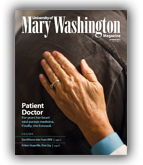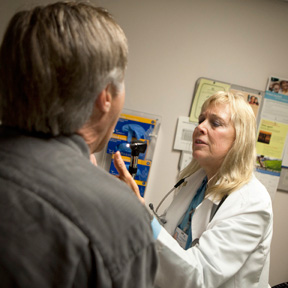 Maureen Marks has always been surrounded. She’s the oldest of seven kids. She has five of her own, and six grandkids. She’s in a book club. She takes community college classes at night. She’s going to France this summer with nine friends she’s known for decades. And for the past six years, she’s been a doctor – seeing streams of patients into the evenings at her family practice in eastern San Diego.
Maureen Marks has always been surrounded. She’s the oldest of seven kids. She has five of her own, and six grandkids. She’s in a book club. She takes community college classes at night. She’s going to France this summer with nine friends she’s known for decades. And for the past six years, she’s been a doctor – seeing streams of patients into the evenings at her family practice in eastern San Diego.
But at dawn, when Marks jumps in the pool to swim, she has only one person to listen to. It’s the same voice she’s listened to as long as she’s lived. Her own.
It’s what pushed her to learn several European languages, what inspired her to swim from Alcatraz to Fisherman’s Wharf five times. It’s the voice that didn’t let her forget, decades later, five kids later, that the chemistry degree she earned at Mary Washington College in 1975 was really a pre-med major. She dreamed of being a doctor.
A love letter barrage
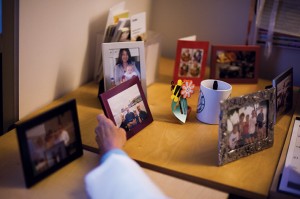
Maureen Marks reaches across her desk to a memento of one of five Alcatraz swims she completed in the San Francisco Bay. Other photos are of family and friends.
Maureen Argo came to Mary Washington College when it was just shedding the tradition of a women’s school. She competed in backstroke and 200-yard freestyle on the college team and swam with the Terrapins synchronized swim club. She majored in chemistry and minored in German.
To help put herself through college, she was a lifeguard at the Fort Belvoir Army post. There was another lifeguard, a guy named Bob Marks, who Maureen didn’t get along with very well. Back at Mary Washington, she had a friend who said she’d gotten a letter from Bob, who was in school at the Virginia Military Institute.
Maureen felt a jolt of jealousy. “I thought, ‘Why is he writing her?’ ”
She mobilized a letter-writing campaign, rallying her dorm-mates to flood Bob’s mailbox with love letters – maybe to throw him off the track of this other girl.
Bob volleyed back. He rounded up some VMI cadets, and they penned odes to the Mary Washington girls. Then one weekend, Bob and three friends came to see Maureen and one of her pals. The pair clicked on a trip into Georgetown and started dating the next summer.
When Bob proposed, Maureen didn’t want a long engagement. She wrapped up her studies, switched her German double major to a minor and graduated a semester early.
I’ll never go back to school
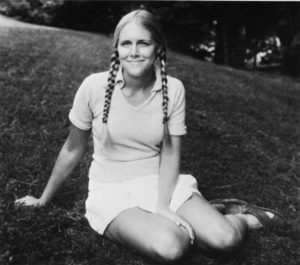
Maureen Penelope Argo, as pictured in the 1975 Battlefield yearbook, was a chemistry major who minored in German. She swam on the Terrapins synchronized swim team and competed in backstroke and freestyle for Mary Washington.
After graduating pre-med, Marks never imagined she’d waitress at the Holiday Inn. But she did, and she substituted at schools while Bob dove into law school at Washington and Lee University. When their first son was 8 weeks old, the military sent Bob and the family to Germany.
Marks picked up gigs teaching swimming and German lessons to the American G.I.s, taking her pupils on outings to restaurants and getting them out of the barracks, all the while raising two young sons.
When they came back to the United States in the early 1980s, the couple decided to move to San Diego. Marks’ list of jobs ballooned. She worked as a substitute teacher, a math and science aide at a Catholic school, a swimming instructor, a tutor.
Marks swam in the mornings and raised her sons to be Eagle Scouts. She’d have the kids fed, bathed, and finished with their homework by the time Bob got home from work.
“I’d say, probably all through my 30s, I thought, ‘Oh, I’ll never go back to school.’ ”
But one time, Marks went to San Francisco for the weekend with some girlfriends who’d raised their kids together in La Mesa.
“I got on the cable car,” Marks said. “We jumped on last-minute, and there’s an Indian woman. And she was young. And she just started talking to me, and I asked her, ‘What are you doing?’ And she said, ‘I’m going to medical school.’ ”
The moment startled her
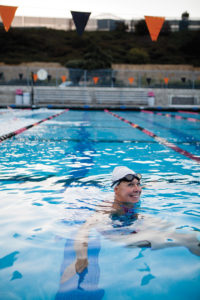
“I was thinking, ‘I’m really jealous.’ And that’s when I thought, ‘You know, I still have that dream.’ ”
– Maureen Marks
“I was thinking, ‘I’m really jealous,’ ” Marks said. “And that’s when I thought, ‘You know, I still have that dream.’ ”
When her youngest son went to kindergarten, she began to research. She picked up a job in a hospital rehab center to add some medical experience to her résumé. She took genetics and immunology and prepared to take the MCAT − the Medical College Admission Test − to get into medical school.
“When I started applying to school, that’s when I realized, like, ‘Wow, I got a really good education at Mary Washington,’ ” she said. “Because when I took the MCAT, it was really not that difficult to study for, after 25 years.”
Still, Marks was in her late 40s. She and Bob had snapped up a recession-time deal on an oceanfront duplex in Pacific Beach and planned to renovate it. Even her parents tried to dissuade her from picking up the doctor dream.
But Marks’ voice, the one she listens to underwater in the morning, is the one she can pick out even – maybe especially − when she’s doing something unconventional. She reminded her globe-trotting, military-trained father that he’d gone back to school to become an accountant at 55.
Younger sister Margaret Argo Page ’82 said the age milestone didn’t faze her sister.
“She would say, ‘In four years, I’m going to be 50. Why not get there and be a doctor?’ ” Page said. “Our family is like that. We keep reinventing ourselves.”
Marks tracked down a professor from her college days, John George, UMW professor emeritus of chemistry, who wrote in wholehearted support of her application. “I would without hesitation put my life in her hands, were she my doctor,” he wrote in a letter of recommendation.
With that, Marks applied. When none of the U.S. schools accepted her, she didn’t waver.
She looked into a university in the Caribbean, a New Jersey-based medical school with training in Dominica – a place to do the academics required for medical students. She could return to the United States for hospital clinical training and residency.
“Well, it’s now or never,” she remembered thinking. “When you want to do something, you just do it.”
She and her youngest children − Ellen, then 13, and Daniel, 8 − would move to Dominica.
They began to pack and included things they wouldn’t be able to get on the volcanic island northwest of Martinique.
“I don’t think I processed it until − I remember packing trunks of granola bars,” Ellen, now 25, said. “That was my first hint that something was definitely going to change.”
We had to boil all our water
It’s not that the hurdles haven’t been there. It’s just as if Marks doesn’t see them.
Move to Dominica, a lightly developed island of fewer than 75,000 people, with two kids?
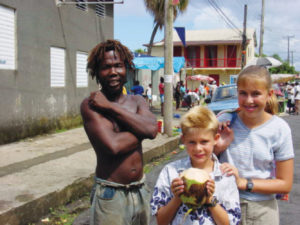
Marks children Daniel and Ellen with a coconut vendor on Dominica, where they lived for two years.
Her description is hardly reassuring: “They still used carbon paper for everything. We had to boil all our water. It was really, really hot.”
Along the road, she’d see groups of men with scars on their faces, carrying machetes.
But she met the challenge. Bob came as often as he could but remained mostly in San Diego to work on the government contract disputes he litigates. Ellen and Daniel found some boldness in traipsing around the island, every so often checking in with their mother.
“We just became these little adults,” Ellen said. “There were only about five places she would be. We had a system, and we were kind of like a team.”
The two years in the books were stressful. Marks would often study until midnight, wake up at 6 a.m., pull her textbooks up off the floor where she’d cast them, and start again.
But the years were fruitful, too. She became close with her classmates, cooking big group dinners. She kept swimming, to a rusty buoy and back. And she drank it all in.
“I just love the human body, and I wanted to learn everything about it,” she said. “I also love people. I just love people.”
Her quest was far from complete when she left Dominica.
Back in the United States, Marks spent her next clinical years in medical school in Bakersfield, Calif., about a five-hour drive from San Diego. She made the trip on weekends, cooking meals and doing laundry before returning for the week.
It wasn’t easy to balance her family with her studies. She did one clinical experience in South Africa, another on a Native American reservation in San Diego, another in Hawaii. But even when she moved to Iowa for her residency, she flew back once a month to participate in mother-daughter charity events with Ellen, by then in high school.
Finally, by 2007, she’d done it – finished med school and residency. Along the way she’d also turned 50; her parents had passed away; her kids were in various stages of high school, college, and careers; Bob had finished the Pacific Beach house; and her diploma read “Maureen Penelope Argo Marks, M.D.”
Despite all the effort it took, it’s not the diplomas she favors displaying in her office, but the memorabilia from the Alcatraz Sharkfests − the five 1.5-mile swims she has made from the historic island prison through the notorious currents and bone-chilling water of the San Francisco Bay. “It’s not that I’m not proud of it,” she said of her M.D. “I just don’t need to flaunt it.”
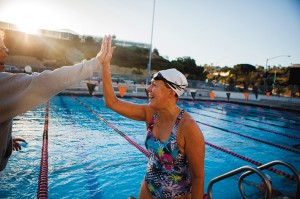
Marks gets a high five from her coach at the La Jolla High School pool in San Diego, where she and her husband take their early morning swims.
Don’t feel limited in any way
On a Monday evening about 5:30, inside a kind of mini-hospital health center, Marks skims through more than a dozen emails from patients, signs off on her medical student’s hours, and collects a few last notes from her nurse. Marks is a family doctor at the Kaiser Permanente center in La Mesa, the eastern San Diego County city where she used to live.
Mondays are extended hours, and any patient from the center can make an evening appointment to see a doctor. It’s a long day to start the week.
Marks pops into one room to examine a woman who’s been awakening to vertigo. In the next, she wallops a diabetic woman’s foot with a vibrating fork to test her sensitivity. A third woman complains she can’t lift her arm above her head.
Marks pokes and stretches and suggests tests and treatments. The Kaiser system suits her approach: Encourage prevention and regular interventions. The doctors can earn awards for managing their patients with diabetes or heart disease. Recently a woman came in after receiving a flurry of reminders about routine tests, letters Kaiser helps its doctors send. The system worked: Marks’ team caught early breast cancer in the patient.
Marks can work at Kaiser for five more years before the system will force her to retire.
She thinks she might travel to different cities, or maybe rural areas, to work for a few months at a time. She wants to learn to play guitar. “I have a lot of energy,” she said. “I’m not ready to retire.”
The boundless energy, and the drive to do something with it, stand out to Ellen, who’s in law school now. She said she didn’t process how different and good her life had been until she got to college. Still, stories about her childhood and her mother surprise her friends.
“Usually I say that she’s crazy first,” she said. “That’s the way I preface any explanation of the last years since 2000.”
But those years push Ellen to think about her own life and career differently.
“It teaches me not to feel limited by even the label of my job,” she said. “She started a new career when she was 48. That teaches me not to feel limited in any way.”
Time to think
When Marks finally leaves the office later in the evening, she sets her alarm for 5:40 the next morning. Bob, who goes with her to the pool, will have been awake since 5.
“He wants to sit and drink his coffee in the dark house,” she said. “I get up as late as possible.”
But when she hits the water, she remembers.
“You’re alone when you’re swimming. It gives you time to think,” she said. “There’s nobody but you and the water. Your head’s underwater. It’s just kind of a relaxing time.”
She’ll finish the swim and drive home. She’ll leave herself about 10 minutes to make some tea, curl her hair, put on makeup, and head out to the clinic. And after another full day of patients, she’ll head to the community college for French class.
As if to explain, Marks mentions a patient who’s 100. Her husband is 107.
“Sixty’s sounding pretty young.”
